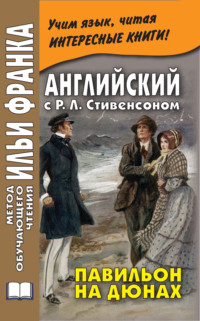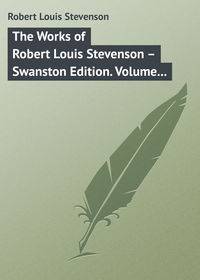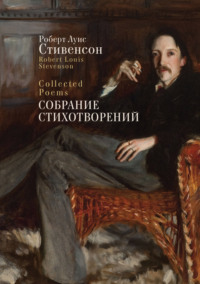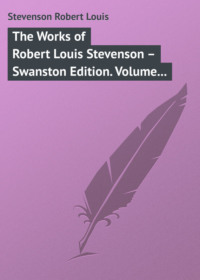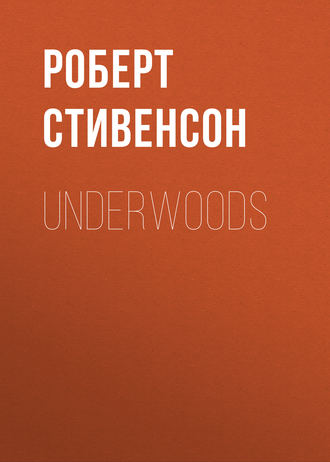 полная версия
полная версияUnderwoods
XIX – KATHARINE
We see you as we see a faceThat trembles in a forest placeUpon the mirror of a poolForever quiet, clear and cool;And in the wayward glass, appearsTo hover between smiles and tears,Elfin and human, airy and true,And backed by the reflected blue.XX – TO F. J. S
I read, dear friend, in your dear faceYour life’s tale told with perfect grace;The river of your life, I traceUp the sun-chequered, devious bedTo the far-distant fountain-head.Not one quick beat of your warm heart,Nor thought that came to you apart,Pleasure nor pity, love nor painNor sorrow, has gone by in vain;But as some lone, wood-wandering childBrings home with him at evening mildThe thorns and flowers of all the wild,From your whole life, O fair and trueYour flowers and thorns you bring with you!XXI – REQUIEM
Under the wide and starry sky,Dig the grave and let me lie.Glad did I live and gladly die, And I laid me down with a will.This be the verse you grave for me:Here he lies where he longed to be;Home is the sailor, home from sea, And the hunter home from the hill.XXII – THE CELESTIAL SURGEON
If I have faltered more or lessIn my great task of happiness;If I have moved among my raceAnd shown no glorious morning face;If beams from happy human eyesHave moved me not; if morning skies,Books, and my food, and summer rainKnocked on my sullen heart in vain: —Lord, thy most pointed pleasure takeAnd stab my spirit broad awake;Or, Lord, if too obdurate I,Choose thou, before that spirit die,A piercing pain, a killing sin,And to my dead heart run them in!XXIII – OUR LADY OF THE SNOWS
Out of the sun, out of the blast,Out of the world, alone I passedAcross the moor and through the woodTo where the monastery stood.There neither lute nor breathing fife,Nor rumour of the world of life,Nor confidences low and dear,Shall strike the meditative ear.Aloof, unhelpful, and unkind,The prisoners of the iron mind,Where nothing speaks except the hellThe unfraternal brothers dwell.Poor passionate men, still clothed afreshWith agonising folds of flesh;Whom the clear eyes solicit stillTo some bold output of the will,While fairy Fancy far beforeAnd musing Memory-Hold-the-doorNow to heroic death inviteAnd now uncurtain fresh delight:O, little boots it thus to dwellOn the remote unneighboured hill!O to be up and doing, OUnfearing and unshamed to goIn all the uproar and the pressAbout my human business!My undissuaded heart I hearWhisper courage in my ear.With voiceless calls, the ancient earthSummons me to a daily birth.Thou, O my love, ye, O my friends —The gist of life, the end of ends —To laugh, to love, to live, to die,Ye call me by the ear and eye!Forth from the casemate, on the plainWhere honour has the world to gain,Pour forth and bravely do your part,O knights of the unshielded heart!Forth and forever forward! – outFrom prudent turret and redoubt,And in the mellay charge amain,To fall but yet to rise again!Captive? ah, still, to honour bright,A captive soldier of the right!Or free and fighting, good with ill?Unconquering but unconquered still!And ye, O brethren, what if God,When from Heav’n’s top he spies abroad,And sees on this tormented stageThe noble war of mankind rage:What if his vivifying eye,O monks, should pass your corner by?For still the Lord is Lord of might;In deeds, in deeds, he takes delight;The plough, the spear, the laden barks,The field, the founded city, marks;He marks the smiler of the streets,The singer upon garden seats;He sees the climber in the rocks:To him, the shepherd folds his flocks.For those he loves that underpropWith daily virtues Heaven’s top,And bear the falling sky with ease,Unfrowning caryatides.Those he approves that ply the trade,That rock the child, that wed the maid,That with weak virtues, weaker hands,Sow gladness on the peopled lands,And still with laughter, song and shout,Spin the great wheel of earth about.But ye? – O ye who linger stillHere in your fortress on the hill,With placid face, with tranquil breath,The unsought volunteers of death,Our cheerful General on highWith careless looks may pass you by.XXIV
Not yet, my soul, these friendly fields desert,Where thou with grass, and rivers, and the breeze,And the bright face of day, thy dalliance hadst;Where to thine ear first sang the enraptured birds;Where love and thou that lasting bargain made.The ship rides trimmed, and from the eternal shoreThou hearest airy voices; but not yetDepart, my soul, not yet awhile depart.Freedom is far, rest far. Thou art with lifeToo closely woven, nerve with nerve intwined;Service still craving service, love for love,Love for dear love, still suppliant with tears.Alas, not yet thy human task is done!A bond at birth is forged; a debt doth lieImmortal on mortality. It grows —By vast rebound it grows, unceasing growth;Gift upon gift, alms upon alms, upreared,From man, from God, from nature, till the soulAt that so huge indulgence stands amazed.Leave not, my soul, the unfoughten field, nor leaveThy debts dishonoured, nor thy place desertWithout due service rendered. For thy life,Up, spirit, and defend that fort of clay,Thy body, now beleaguered; whether soonOr late she fall; whether to-day thy friendsBewail thee dead, or, after years, a manGrown old in honour and the friend of peace.Contend, my soul, for moments and for hours;Each is with service pregnant; each reclaimedIs as a kingdom conquered, where to reign.As when a captain rallies to the fightHis scattered legions, and beats ruin back,He, on the field, encamps, well pleased in mind.Yet surely him shall fortune overtake,Him smite in turn, headlong his ensigns drive;And that dear land, now safe, to-morrow fall.But he, unthinking, in the present goodSolely delights, and all the camps rejoice.XXV
It is not yours, O mother, to complain,Not, mother, yours to weep,Though nevermore your son againShall to your bosom creep,Though nevermore again you watch your baby sleep.Though in the greener paths of earth,Mother and child, no moreWe wander; and no more the birthOf me whom once you bore,Seems still the brave reward that once it seemed of yore;Though as all passes, day and night,The seasons and the years,From you, O mother, this delight,This also disappears —Some profit yet survives of all your pangs and tears.The child, the seed, the grain of corn,The acorn on the hill,Each for some separate end is bornIn season fit, and stillEach must in strength arise to work the almighty will.So from the hearth the children flee,By that almighty handAusterely led; so one by seaGoes forth, and one by land;Nor aught of all man’s sons escapes from that commandSo from the sally each obeysThe unseen almighty nod;So till the ending all their waysBlindfolded loth have trod:Nor knew their task at all, but were the tools of God.And as the fervent smith of yoreBeat out the glowing blade,Nor wielded in the front of warThe weapons that he made,But in the tower at home still plied his ringing trade;So like a sword the son shall roamOn nobler missions sent;And as the smith remained at homeIn peaceful turret pent,So sits the while at home the mother well content.XXVI – THE SICK CHILD
Child. O mother, lay your hand on my brow!O mother, mother, where am I now?Why is the room so gaunt and great?Why am I lying awake so late?Mother. Fear not at all: the night is still.Nothing is here that means you ill —Nothing but lamps the whole town through,And never a child awake but you.Child. Mother, mother, speak low in my ear,Some of the things are so great and near,Some are so small and far away,I have a fear that I cannot say,What have I done, and what do I fear,And why are you crying, mother dear?Mother. Out in the city, sounds beginThank the kind God, the carts come in!An hour or two more, and God is so kind,The day shall be blue in the window-blind,Then shall my child go sweetly asleep,And dream of the birds and the hills of sheep.XXVII – IN MEMORIAM F. A. S
Yet, O stricken heart, remember, O remember How of human days he lived the better part.April came to bloom and never dim December Breathed its killing chills upon the head or heart.Doomed to know not Winter, only Spring, a being Trod the flowery April blithely for a while,Took his fill of music, joy of thought and seeing, Came and stayed and went, nor ever ceased to smile.Came and stayed and went, and now when all is finished, You alone have crossed the melancholy stream,Yours the pang, but his, O his, the undiminished Undecaying gladness, undeparted dream.All that life contains of torture, toil, and treason, Shame, dishonour, death, to him were but a name.Here, a boy, he dwelt through all the singing season And ere the day of sorrow departed as he came. Davos, 1881.XXVIII – TO MY FATHER
Peace and her huge invasion to these shoresPuts daily home; innumerable sailsDawn on the far horizon and draw near;Innumerable loves, uncounted hopesTo our wild coasts, not darkling now, approach:Not now obscure, since thou and thine are there,And bright on the lone isle, the foundered reef,The long, resounding foreland, Pharos stands.These are thy works, O father, these thy crown;Whether on high the air be pure, they shineAlong the yellowing sunset, and all nightAmong the unnumbered stars of God they shine;Or whether fogs arise and far and wideThe low sea-level drown – each finds a tongueAnd all night long the tolling bell resounds:So shine, so toll, till night be overpast,Till the stars vanish, till the sun return,And in the haven rides the fleet secure.In the first hour, the seaman in his skiffMoves through the unmoving bay, to where the townIts earliest smoke into the air upbreathesAnd the rough hazels climb along the beach.To the tugg’d oar the distant echo speaks.The ship lies resting, where by reef and roostThou and thy lights have led her like a child.This hast thou done, and I – can I be base?I must arise, O father, and to portSome lost, complaining seaman pilot home.XXIX – IN THE STATES
With half a heart I wander here As from an age gone byA brother – yet though young in years. An elder brother, I.You speak another tongue than mine, Though both were English born.I towards the night of time decline, You mount into the morn.Youth shall grow great and strong and free, But age must still decay:To-morrow for the States – for me, England and Yesterday.San Francisco.XXX – A PORTRAIT
I am a kind of farthing dip, Unfriendly to the nose and eyes;A blue-behinded ape, I skip Upon the trees of Paradise.At mankind’s feast, I take my place In solemn, sanctimonious state,And have the air of saying grace While I defile the dinner plate.I am “the smiler with the knife,” The battener upon garbage, I —Dear Heaven, with such a rancid life, Were it not better far to die?Yet still, about the human pale, I love to scamper, love to race,To swing by my irreverent tail All over the most holy place;And when at length, some golden day, The unfailing sportsman, aiming at,Shall bag, me – all the world shall say: Thank God, and there’s an end of that!XXXI
Sing clearlier, Muse, or evermore be still,Sing truer or no longer sing!No more the voice of melancholy JacquesTo wake a weeping echo in the hill;But as the boy, the pirate of the spring,From the green elm a living linnet takes,One natural verse recapture – then be still.XXXII – A CAMP 2
The bed was made, the room was fit,By punctual eve the stars were lit;The air was still, the water ran,No need was there for maid or man,When we put up, my ass and I,At God’s green caravanserai.XXXIII – THE COUNTRY OF THE CAMISARDS 3
We travelled in the print of olden wars, Yet all the land was green, And love we found, and peace, Where fire and war had been.They pass and smile, the children of the sword — No more the sword they wield; And O, how deep the corn Along the battlefield!XXXIV – SKERRYVORE
For love of lovely words, and for the sakeOf those, my kinsmen and my countrymen,Who early and late in the windy ocean toiledTo plant a star for seamen, where was thenThe surfy haunt of seals and cormorants:I, on the lintel of this cot, inscribeThe name of a strong tower.XXXV – SKERRYVORE: The Parallel
Here all is sunny, and when the truant gullSkims the green level of the lawn, his wingDispetals roses; here the house is framedOf kneaded brick and the plumed mountain pine,Such clay as artists fashion and such woodAs the tree-climbing urchin breaks. But thereEternal granite hewn from the living isleAnd dowelled with brute iron, rears a towerThat from its wet foundation to its crownOf glittering glass, stands, in the sweep of winds,Immovable, immortal, eminent.XXXVI
My house, I say. But hark to the sunny dovesThat make my roof the arena of their loves,That gyre about the gable all day longAnd fill the chimneys with their murmurous song:Our house, they say; and mine, the cat declaresAnd spreads his golden fleece upon the chairs;And mine the dog, and rises stiff with wrathIf any alien foot profane the path.So too the buck that trimmed my terraces,Our whilome gardener, called the garden his;Who now, deposed, surveys my plain abodeAnd his late kingdom, only from the road.XXXVII
My body which my dungeon is,And yet my parks and palaces: — Which is so great that there I goAll the day long to and fro,And when the night begins to fallThrow down my bed and sleep, while allThe building hums with wakefulness —Even as a child of savagesWhen evening takes her on her way,(She having roamed a summer’s dayAlong the mountain-sides and scalp)Sleeps in an antre of that alp: — Which is so broad and high that there,As in the topless fields of air,My fancy soars like to a kiteAnd faints in the blue infinite: — Which is so strong, my strongest throesAnd the rough world’s besieging blowsNot break it, and so weak withal,Death ebbs and flows in its loose wallAs the green sea in fishers’ nets,And tops its topmost parapets: — Which is so wholly mine that ICan wield its whole artillery,And mine so little, that my soulDwells in perpetual control,And I but think and speak and doAs my dead fathers move me to: — If this born body of my bonesThe beggared soul so barely owns,What money passed from hand to hand,What creeping custom of the land,What deed of author or assign,Can make a house a thing of mine?XXXVIII
Say not of me that weakly I declinedThe labours of my sires, and fled the sea,The towers we founded and the lamps we lit,To play at home with paper like a child.But rather say: In the afternoon of timeA strenuous family dusted from its handsThe sand of granite, and beholding farAlong the sounding coast its pyramidsAnd tall memorials catch the dying sun,Smiled well content, and to this childish taskAround the fire addressed its evening hours.BOOK II. —In Scots
TABLE OF COMMON SCOTTISH VOWEL SOUNDS
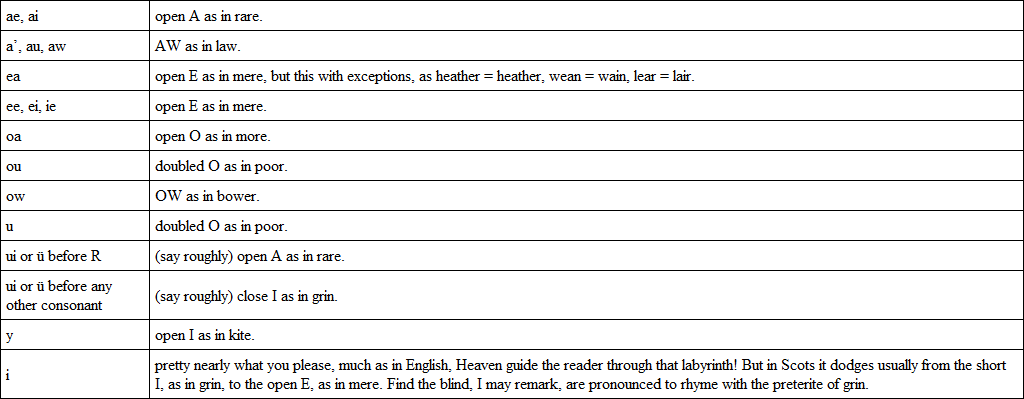
I – THE MAKER TO POSTERITY
Far ’yont amang the years to beWhen a’ we think, an’ a’ we see,An’ a’ we luve, ’s been dung ajee By time’s rouch shouther,An’ what was richt and wrang for me Lies mangled throu’ther,It’s possible – it’s hardly mair —That some ane, ripin’ after lear —Some auld professor or young heir, If still there’s either —May find an’ read me, an’ be sair Perplexed, puir brither!“What tongue does your auld bookie speak?”He’ll spier; an’ I, his mou to steik:“No bein’ fit to write in Greek, I write in Lallan,Dear to my heart as the peat reek, Auld as Tantallon.“Few spak it then, an’ noo there’s nane.My puir auld sangs lie a’ their lane,Their sense, that aince was braw an’ plain, Tint a’thegether,Like runes upon a standin’ stane Amang the heather.“But think not you the brae to speel;You, tae, maun chow the bitter peel;For a’ your lear, for a’ your skeel, Ye’re nane sae lucky;An’ things are mebbe waur than weel For you, my buckie.“The hale concern (baith hens an’ eggs,Baith books an’ writers, stars an’ clegs)Noo stachers upon lowsent legs An’ wears awa’;The tack o’ mankind, near the dregs, Rins unco law.“Your book, that in some braw new tongue,Ye wrote or prentit, preached or sung,Will still be just a bairn, an’ young In fame an’ years,Whan the hale planet’s guts are dung About your ears;“An’ you, sair gruppin’ to a sparOr whammled wi’ some bleezin’ star,Cryin’ to ken whaur deil ye are, Hame, France, or Flanders—Whang sindry like a railway car An’ flie in danders.”II – ILLE TERRARUM
Frae nirly, nippin’, Eas’lan’ breeze,Frae Norlan’ snaw, an’ haar o’ seas,Weel happit in your gairden trees, A bonny bit,Atween the muckle Pentland’s knees, Secure ye sit.Beeches an’ aiks entwine their theek,An’ firs, a stench, auld-farrant clique.A’ simmer day, your chimleys reek, Couthy and bien;An’ here an’ there your windies keek Amang the green.A pickle plats an’ paths an’ posies,A wheen auld gillyflowers an’ roses:A ring o’ wa’s the hale encloses Frae sheep or men;An’ there the auld housie beeks an’ dozes, A’ by her lane.The gairdner crooks his weary backA’ day in the pitaty-track,Or mebbe stops awhile to crack Wi’ Jane the cook,Or at some buss, worm-eaten-black, To gie a look.Frae the high hills the curlew ca’s;The sheep gang baaing by the wa’s;Or whiles a clan o’ roosty craws Cangle thegether;The wild bees seek the gairden raws, Weariet wi’ heather.Or in the gloamin’ douce an’ grayThe sweet-throat mavis tunes her lay;The herd comes linkin’ doun the brae; An’ by degreesThe muckle siller müne maks way Amang the trees.Here aft hae I, wi’ sober heart,For meditation sat apairt,When orra loves or kittle art Perplexed my mind;Here socht a balm for ilka smart O’ humankind.Here aft, weel neukit by my lane,Wi’ Horace, or perhaps Montaigne,The mornin’ hours hae come an’ gane Abüne my heid —I wadnae gi’en a chucky-stane For a’ I’d read.But noo the auld city, street by street,An’ winter fu’ o’ snaw an’ sleet,Awhile shut in my gangrel feet An’ goavin’ mettle;Noo is the soopit ingle sweet, An’ liltin’ kettle.An’ noo the winter winds complain;Cauld lies the glaur in ilka lane;On draigled hizzie, tautit wean An’ drucken lads,In the mirk nicht, the winter rain Dribbles an’ blads.Whan bugles frae the Castle rock,An’ beaten drums wi’ dowie shock,Wauken, at cauld-rife sax o’clock, My chitterin’ frame,I mind me on the kintry cock, The kintry hame.I mind me on yon bonny bield;An’ Fancy traivels far afieldTo gaither a’ that gairdens yield O’ sun an’ Simmer:To hearten up a dowie chield, Fancy’s the limmer!III
When aince Aprile has fairly come,An’ birds may bigg in winter’s lum,An’ pleisure’s spreid for a’ and some O’ whatna state,Love, wi’ her auld recruitin’ drum, Than taks the gate.The heart plays dunt wi’ main an’ micht;The lasses’ een are a’ sae bricht,Their dresses are sae braw an’ ticht, The bonny birdies! —Puir winter virtue at the sicht Gangs heels ower hurdies.An’ aye as love frae land to landTirls the drum wi’ eident hand,A’ men collect at her command, Toun-bred or land’art,An’ follow in a denty band Her gaucy standart.An’ I, wha sang o’ rain an’ snaw,An’ weary winter weel awa’,Noo busk me in a jacket braw, An’ tak my placeI’ the ram-stam, harum-scarum raw, Wi’ smilin’ face.IV – A MILE AN’ A BITTOCK
A mile an’ a bittock, a mile or twa,Abüthe burn, ayont the law,Davie an’ Donal’ an’ Cherlie an’ a’, An’ the müne was shinin’ clearly!Ane went hame wi’ the ither, an’ thenThe ither went hame wi’ the ither twa men,An’ baith wad return him the service again, An’ the müne was shinin’ clearly!The clocks were chappin’ in house an’ ha’,Eleeven, twal an’ ane an’ twa;An’ the guidman’s face was turnt to the wa’, An’ the müne was shinin’ clearly!A wind got up frae affa the sea,It blew the stars as clear’s could be,It blew in the een of a’ o’ the three, An’ the müne was shinin’ clearly!Noo, Davie was first to get sleep in his head,“The best o’ frien’s maun twine,” he said;“I’m weariet, an’ here I’m awa’ to my bed.” An’ the müne was shinin’ clearly!Twa o’ them walkin’ an’ crackin’ their lane,The mornin’ licht cam gray an’ plain,An’ the birds they yammert on stick an’ stane, An’ the müne was shinin’ clearly!O years ayont, O years awa’,My lads, ye’ll mind whate’er befa’ —My lads, ye’ll mind on the bield o’ the law, When the müne was shinin’ clearly.V – A LOWDEN SABBATH MORN
The clinkum-clank o’ Sabbath bellsNoo to the hoastin’ rookery swells,Noo faintin’ laigh in shady dells, Sounds far an’ near,An’ through the simmer kintry tells Its tale o’ cheer.An’ noo, to that melodious play,A’ deidly awn the quiet sway —A’ ken their solemn holiday, Bestial an’ human,The singin’ lintie on the brae, The restin’ plou’man,He, mair than a’ the lave o’ men,His week completit joys to ken;Half-dressed, he daunders out an’ in, Perplext wi’ leisure;An’ his raxt limbs he’ll rax again Wi’ painfü’ pleesure.The steerin’ mither strang afitNoo shoos the bairnies but a bit;Noo cries them ben, their Sinday shüit To scart upon them,Or sweeties in their pouch to pit, Wi’ blessin’s on them.The lasses, clean frae tap to taes,Are busked in crunklin’ underclaes;The gartened hose, the weel-filled stays, The nakit shift,A’ bleached on bonny greens for days, An’ white’s the drift.An’ noo to face the kirkward mile:The guidman’s hat o’ dacent style,The blackit shoon, we noo maun fyle As white’s the miller:A waefü’ peety tae, to spile The warth o’ siller.Our Marg’et, aye sae keen to crack,Douce-stappin’ in the stoury track,Her emeralt goun a’ kiltit back Frae snawy coats,White-ankled, leads the kirkward pack Wi’ Dauvit Groats.A thocht ahint, in runkled breeks,A’ spiled wi’ lyin’ by for weeks,The guidman follows closs, an’ cleiks The sonsie missis;His sarious face at aince bespeaks The day that this is.And aye an’ while we nearer drawTo whaur the kirkton lies alaw,Mair neebours, comin’ saft an’ slaw Frae here an’ there,The thicker thrang the gate an’ caw The stour in air.But hark! the bells frae nearer clang;To rowst the slaw, their sides they bang;An’ see! black coats a’ready thrang The green kirkyaird;And at the yett, the chestnuts spang That brocht the laird.The solemn elders at the plateStand drinkin’ deep the pride o’ state:The practised hands as gash an’ great As Lords o’ Session;The later named, a wee thing blate In their expression.The prentit stanes that mark the deid,Wi’ lengthened lip, the sarious read;Syne wag a moraleesin’ heid, An’ then an’ thereTheir hirplin’ practice an’ their creed Try hard to square.It’s here our Merren lang has lain,A wee bewast the table-stane;An’ yon’s the grave o’ Sandy Blane; An’ further ower,The mither’s brithers, dacent men! Lie a’ the fower.Here the guidman sall bide aweeTo dwall amang the deid; to seeAuld faces clear in fancy’s e’e; Belike to hearAuld voices fa’in saft an’ slee On fancy’s ear.Thus, on the day o’ solemn things,The bell that in the steeple swingsTo fauld a scaittered faim’ly rings Its walcome screed;An’ just a wee thing nearer brings The quick an’ deid.But noo the bell is ringin’ in;To tak their places, folk begin;The minister himsel’ will shüne Be up the gate,Filled fu’ wi’ clavers about sin An’ man’s estate.The tünes are up —French, to be shüre,The faithfü’ French, an’ twa-three mair;The auld prezentor, hoastin’ sair, Wales out the portions,An’ yirks the tüne into the air Wi’ queer contortions.Follows the prayer, the readin’ next,An’ than the fisslin’ for the text —The twa-three last to find it, vext But kind o’ proud;An’ than the peppermints are raxed, An’ southernwood.For noo’s the time whan pews are seenNid-noddin’ like a mandareen;When tenty mithers stap a preen In sleepin’ weans;An’ nearly half the parochine Forget their pains.There’s just a waukrif’ twa or three:Thrawn commentautors sweer to ’gree,Weans glowrin’ at the bumlin’ bee On windie-glasses,Or lads that tak a keek a-glee At sonsie lasses.Himsel’, meanwhile, frae whaur he cocksAn’ bobs belaw the soundin’-box,The treesures of his words unlocks Wi’ prodigality,An’ deals some unco dingin’ knocks To infidality.Wi’ sappy unction, hoo he burkesThe hopes o’ men that trust in works,Expounds the fau’ts o’ ither kirks, An’ shaws the best o’ themNo muckle better than mere Turks, When a’s confessed o’ them.Bethankit! what a bonny creed!What mair would ony Christian need? —The braw words rumm’le ower his heid, Nor steer the sleeper;And in their restin’ graves, the deid Sleep aye the deeper.Note. – It may be guessed by some that I had a certain parish in my eye, and this makes it proper I should add a word of disclamation. In my time there have been two ministers in that parish. Of the first I have a special reason to speak well, even had there been any to think ill. The second I have often met in private and long (in the due phrase) “sat under” in his church, and neither here nor there have I heard an unkind or ugly word upon his lips. The preacher of the text had thus no original in that particular parish; but when I was a boy, he might have been observed in many others; he was then (like the schoolmaster) abroad; and by recent advices, it would seem he has not yet entirely disappeared.




